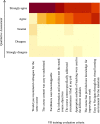Feasibility of virtual reality based training for optimising COVID-19 case handling in Uganda
- PMID: 35418070
- PMCID: PMC9006530
- DOI: 10.1186/s12909-022-03294-x
Feasibility of virtual reality based training for optimising COVID-19 case handling in Uganda
Abstract
Background: Epidemics and pandemics are causing high morbidity and mortality on a still-evolving scale exemplified by the COVID-19 pandemic. Infection prevention and control (IPC) training for frontline health workers is thus essential. However, classroom or hospital ward-based training portends an infection risk due to the in-person interaction of participants. We explored the use of Virtual Reality (VR) simulations for frontline health worker training since it trains participants without exposing them to infections that would arise from in-person training. It does away with the requirement for expensive personal protective equipment (PPE) that has been in acute shortage and improves learning, retention, and recall. This represents the first attempt in deploying VR-based pedagogy in a Ugandan medical education context.
Methods: We used animated VR-based simulations of bedside and ward-based training scenarios for frontline health workers. The training covered the donning and doffing of PPE, case management of COVID-19 infected individuals, and hand hygiene. It used VR headsets to actualize an immersive experience, via a hybrid of fully-interactive VR and 360° videos. The level of knowledge acquisition between individuals trained using this method was compared to similar cohorts previously trained in a classroom setting. That evaluation was supplemented by a qualitative assessment based on feedback from participants about their experience.
Results: The effort resulted in a COVID-19 IPC curriculum adapted into VR, corresponding VR content, and a pioneer cohort of VR trained frontline health workers. The formalized comparison with classroom-trained cohorts showed relatively better outcomes by way of skills acquired, speed of learning, and rates of information retention (P-value = 4.0e-09). In the qualitative assessment, 90% of the participants rated the method as very good, 58.1% strongly agreed that the activities met the course objectives, and 97.7% strongly indicated willingness to refer the course to colleagues.
Conclusion: VR-based COVID-19 IPC training is feasible, effective and achieves enhanced learning while protecting participants from infections within a pandemic setting in Uganda. It is a delivery medium transferable to the contexts of other highly infectious diseases.
Keywords: COVID-19; Medical education; Pandemics; Personal protective equipment; Virtual reality.
© 2022. The Author(s).
Conflict of interest statement
The authors declare no conflict of interest.
Figures





Update of
-
Feasibility of Virtual Reality based Training for Optimising COVID-19 Case Handling in Uganda.Res Sq [Preprint]. 2021 Oct 4:rs.3.rs-882147. doi: 10.21203/rs.3.rs-882147/v1. Res Sq. 2021. Update in: BMC Med Educ. 2022 Apr 13;22(1):274. doi: 10.1186/s12909-022-03294-x. PMID: 34611655 Free PMC article. Updated. Preprint.
References
-
- Uganda, M.o.H . Uganda National Infection Prevention And Control Guidelines 2013. 2013.
-
- The republic of Uganda, M . COVID 19 Daily situation report - 265. 2021. 2021.
MeSH terms
LinkOut - more resources
Full Text Sources
Medical
Miscellaneous

